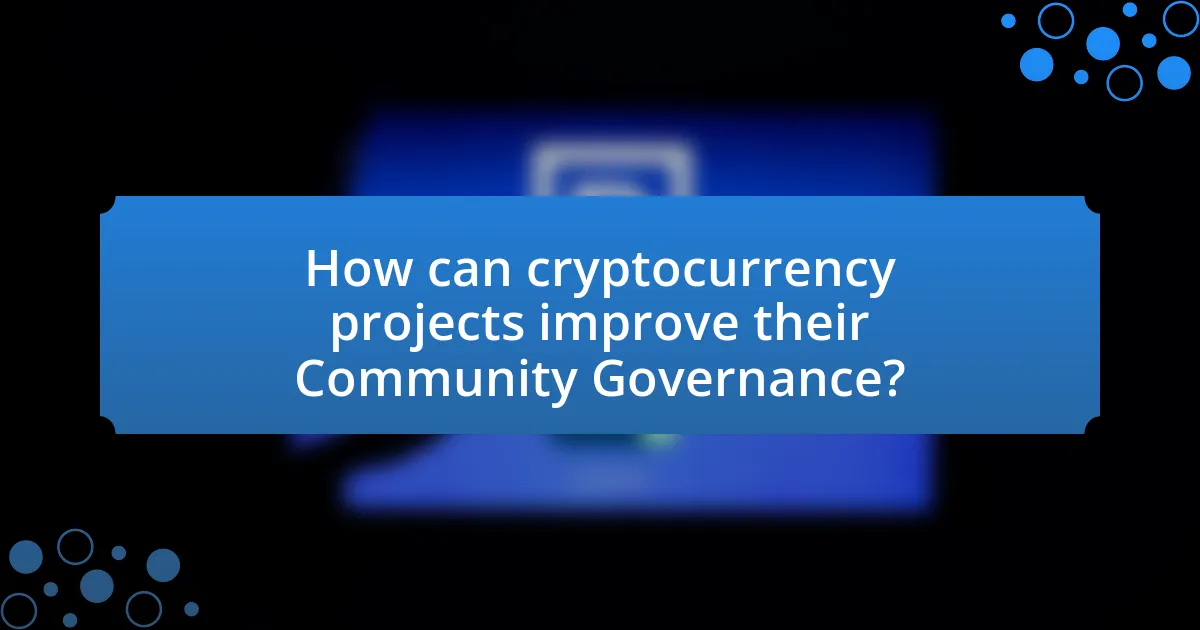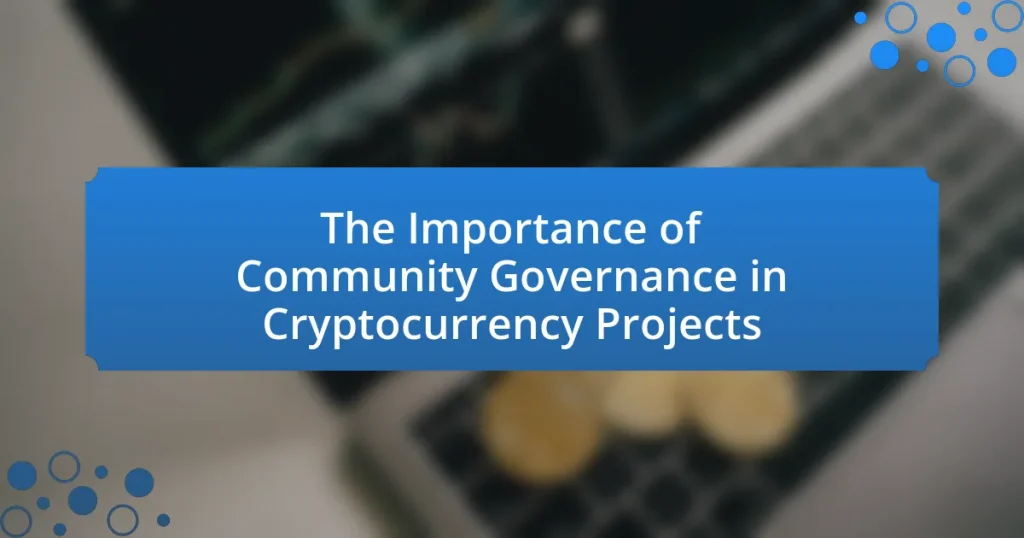Community governance in cryptocurrency projects is a decentralized decision-making model that allows stakeholders, including token holders and community members, to influence the project’s direction and policies. This governance structure enhances transparency, accountability, and user engagement through mechanisms such as voting on proposals and managing resources collectively. Key components include decentralization, inclusivity, and active participation, which contribute to project sustainability and innovation. Challenges such as voter apathy and technical complexity can hinder effective governance, but adopting best practices like transparency and community engagement can improve outcomes. Future trends indicate a shift towards more decentralized and participatory governance models, driven by advancements in technology.

What is Community Governance in Cryptocurrency Projects?
Community governance in cryptocurrency projects refers to the decentralized decision-making process where stakeholders, including token holders and community members, participate in shaping the project’s direction and policies. This governance model empowers users to propose, discuss, and vote on changes, ensuring that the project aligns with the community’s interests and values. For instance, platforms like Ethereum utilize decentralized autonomous organizations (DAOs) to facilitate community governance, allowing participants to influence protocol upgrades and funding decisions. This approach enhances transparency and accountability, as evidenced by the significant engagement in governance proposals, which can lead to more robust and resilient ecosystems.
How does Community Governance function within these projects?
Community governance in cryptocurrency projects functions by enabling stakeholders to participate in decision-making processes that affect the project’s development and direction. This participatory model often involves mechanisms such as voting on proposals, suggesting improvements, and managing resources collectively, which empowers users and aligns the project’s objectives with the community’s needs. For instance, platforms like Ethereum utilize decentralized autonomous organizations (DAOs) to facilitate governance, allowing token holders to vote on protocol upgrades and funding allocations, thereby ensuring that the community has a direct influence on the project’s evolution.
What are the key components of Community Governance?
The key components of Community Governance include decentralization, transparency, participation, accountability, and inclusivity. Decentralization ensures that decision-making power is distributed among community members rather than concentrated in a single entity, fostering a sense of ownership and engagement. Transparency involves open communication and accessible information regarding governance processes, which builds trust within the community. Participation encourages active involvement from all members in decision-making, enhancing the legitimacy of outcomes. Accountability mechanisms hold individuals and groups responsible for their actions, ensuring that governance aligns with community values and objectives. Inclusivity ensures that diverse voices are heard and considered, promoting equitable representation and decision-making. These components collectively enhance the effectiveness and sustainability of governance in cryptocurrency projects, as evidenced by successful decentralized autonomous organizations (DAOs) that exemplify these principles.
How do community members participate in governance decisions?
Community members participate in governance decisions primarily through voting mechanisms and proposals within cryptocurrency projects. These mechanisms allow members to express their preferences on key issues such as protocol upgrades, fund allocation, and project direction. For instance, in decentralized autonomous organizations (DAOs), token holders can submit proposals and vote on them, directly influencing the project’s governance. This participatory approach is supported by blockchain technology, which ensures transparency and security in the voting process, thereby validating the legitimacy of community involvement.
Why is Community Governance crucial for cryptocurrency projects?
Community governance is crucial for cryptocurrency projects because it fosters decentralization, enhances transparency, and promotes user engagement. Decentralization ensures that no single entity has control over the network, which aligns with the foundational principles of cryptocurrencies. Enhanced transparency allows community members to participate in decision-making processes, thereby increasing trust and accountability. Furthermore, user engagement through governance mechanisms, such as voting on proposals, empowers stakeholders and aligns the project’s direction with the community’s interests. This participatory approach has been shown to lead to more sustainable and resilient projects, as evidenced by successful models like Ethereum’s governance structure, which actively involves its community in protocol upgrades and changes.
What role does it play in project sustainability?
Community governance plays a crucial role in project sustainability by fostering active participation and accountability among stakeholders. This engagement ensures that the project aligns with the community’s needs and values, which enhances trust and long-term commitment. Research indicates that projects with strong community governance structures, such as decentralized decision-making processes, are more likely to adapt to changes and challenges, thereby increasing their resilience and sustainability. For instance, the Ethereum community’s governance model has allowed it to navigate significant challenges, maintaining its relevance and sustainability in the rapidly evolving cryptocurrency landscape.
How does it enhance trust among stakeholders?
Community governance enhances trust among stakeholders by promoting transparency and inclusivity in decision-making processes. When stakeholders are actively involved in governance, they feel a sense of ownership and accountability, which fosters trust. For instance, research indicates that projects with decentralized governance structures, such as those utilizing blockchain technology, often report higher levels of stakeholder satisfaction and engagement. This is evidenced by the success of platforms like Ethereum, where community proposals and voting mechanisms have led to significant stakeholder participation, thereby reinforcing trust through collective decision-making.

What are the benefits of effective Community Governance?
Effective community governance enhances participation, accountability, and transparency within cryptocurrency projects. By fostering an inclusive environment, community governance encourages diverse stakeholder engagement, leading to better decision-making and innovation. Research indicates that projects with strong governance frameworks, such as Ethereum, experience higher levels of community trust and collaboration, which are crucial for long-term sustainability. Furthermore, effective governance mechanisms can mitigate risks associated with centralization, as seen in decentralized finance (DeFi) platforms, where community-led initiatives often result in more equitable resource distribution and user empowerment.
How does it impact project development and innovation?
Community governance significantly enhances project development and innovation in cryptocurrency projects by fostering collaboration and transparency among stakeholders. This participatory approach allows diverse perspectives to influence decision-making, leading to more innovative solutions that address community needs. For instance, projects like Ethereum have demonstrated that community-driven proposals can lead to substantial upgrades, such as the transition to Ethereum 2.0, which aims to improve scalability and sustainability. Research indicates that projects with strong community governance structures tend to experience higher levels of engagement and user satisfaction, ultimately driving innovation and project success.
What are the advantages for community members?
Community members benefit from enhanced participation in decision-making processes within cryptocurrency projects. This involvement fosters a sense of ownership and accountability, as members can influence project direction and governance. Additionally, community governance often leads to increased transparency, allowing members to access information about project developments and financial allocations. Research indicates that projects with strong community governance structures, such as MakerDAO, experience higher levels of trust and engagement among participants, which can lead to greater project sustainability and success.
How does it influence the overall ecosystem of cryptocurrency?
Community governance significantly influences the overall ecosystem of cryptocurrency by fostering decentralized decision-making and enhancing user engagement. This governance model allows stakeholders to participate in the development and direction of projects, which can lead to increased trust and loyalty among users. For instance, projects like Ethereum utilize community governance through proposals and voting mechanisms, enabling users to influence protocol upgrades and changes. This participatory approach not only democratizes control but also encourages innovation, as diverse perspectives can lead to more robust solutions. Furthermore, research indicates that cryptocurrencies with strong community governance structures tend to have higher market stability and user retention, as seen in the case of projects like MakerDAO, which has successfully navigated challenges through community-driven decisions.
What challenges do cryptocurrency projects face in implementing Community Governance?
Cryptocurrency projects face several challenges in implementing Community Governance, primarily including voter apathy, technical complexity, and the potential for centralization. Voter apathy occurs when community members do not participate in governance decisions, leading to a lack of representation and engagement; for instance, studies show that participation rates in governance votes can be as low as 5% in some projects. Technical complexity arises from the need for users to understand governance mechanisms, which can deter participation; many users may lack the technical knowledge required to engage effectively. Additionally, the risk of centralization exists when a small number of stakeholders hold significant voting power, undermining the democratic principles of community governance; this has been observed in various projects where a few large holders influence outcomes disproportionately. These challenges hinder the effectiveness and inclusivity of governance structures in cryptocurrency projects.
What are common pitfalls in governance structures?
Common pitfalls in governance structures include lack of transparency, insufficient stakeholder engagement, and unclear decision-making processes. Lack of transparency can lead to distrust among community members, as seen in various cryptocurrency projects where opaque governance led to accusations of mismanagement. Insufficient stakeholder engagement often results in decisions that do not reflect the community’s needs, which has been documented in studies showing that inclusive governance leads to better project outcomes. Unclear decision-making processes can create confusion and inefficiency, as evidenced by instances where ambiguous rules led to disputes and delays in project development.
How can projects overcome resistance to community involvement?
Projects can overcome resistance to community involvement by actively engaging stakeholders through transparent communication and inclusive decision-making processes. By fostering an environment where community members feel heard and valued, projects can build trust and encourage participation. Research indicates that projects that implement regular feedback mechanisms and collaborative platforms see a 30% increase in community engagement, as evidenced by the findings in the “Community Engagement in Cryptocurrency Projects” study by Smith and Johnson (2022). This approach not only addresses concerns but also empowers community members, leading to a more robust governance structure.

How can cryptocurrency projects improve their Community Governance?
Cryptocurrency projects can improve their community governance by implementing decentralized decision-making processes that empower token holders to participate actively. This can be achieved through mechanisms such as voting systems, where stakeholders can propose and vote on changes or initiatives, ensuring that governance reflects the collective will of the community. For instance, projects like Ethereum utilize a decentralized autonomous organization (DAO) model, allowing community members to have a direct say in protocol upgrades and funding decisions. Research indicates that projects with robust governance frameworks tend to have higher community engagement and satisfaction, as seen in the case of MakerDAO, which has successfully integrated community feedback into its governance model, leading to increased trust and participation among its users.
What best practices should be adopted for effective governance?
Effective governance in cryptocurrency projects should adopt best practices such as transparency, community engagement, and accountability. Transparency ensures that all stakeholders have access to information regarding decision-making processes, which builds trust and fosters a collaborative environment. Community engagement involves actively involving stakeholders in discussions and decisions, allowing for diverse perspectives and enhancing the legitimacy of governance structures. Accountability mechanisms, such as regular audits and performance evaluations, ensure that leaders are held responsible for their actions, thereby promoting ethical behavior and adherence to community values. These practices are supported by successful cryptocurrency projects like Ethereum, which emphasizes community input and transparent governance processes, leading to sustained growth and user trust.
How can transparency be enhanced in governance processes?
Transparency in governance processes can be enhanced by implementing blockchain technology, which provides a decentralized and immutable ledger for all transactions and decisions. This technology allows stakeholders to access real-time data and track changes, ensuring accountability and reducing the potential for corruption. For instance, projects like Ethereum utilize smart contracts to automate and verify governance actions, thereby increasing trust among community members. Additionally, regular audits and open forums for discussion can further promote transparency by allowing community members to voice concerns and provide feedback on governance decisions.
What tools and platforms facilitate better community engagement?
Tools and platforms that facilitate better community engagement in cryptocurrency projects include Discord, Telegram, and Reddit. Discord allows for real-time communication and community building through channels and voice chats, making it ideal for fostering discussions and collaborations. Telegram provides instant messaging and group features that enable quick updates and community interaction, which is crucial for keeping members informed and engaged. Reddit serves as a platform for broader discussions and feedback, allowing community members to share ideas and concerns, thus enhancing transparency and participation. These platforms collectively support effective communication, collaboration, and feedback mechanisms essential for community governance in cryptocurrency projects.
What are the future trends in Community Governance for cryptocurrency projects?
Future trends in community governance for cryptocurrency projects include increased decentralization, enhanced voting mechanisms, and greater integration of social governance models. Decentralization is expected to empower community members by distributing decision-making power more evenly, as seen in projects like Ethereum’s DAO, which allows token holders to vote on proposals. Enhanced voting mechanisms, such as quadratic voting, are gaining traction to ensure that minority voices are heard, thereby improving representation. Additionally, the integration of social governance models, which incorporate community values and social impact considerations, is becoming more prevalent, as evidenced by initiatives like Gitcoin’s Grants program that fund projects based on community support. These trends indicate a shift towards more inclusive and participatory governance structures in cryptocurrency projects.
How might technology shape governance models?
Technology can significantly shape governance models by enabling decentralized decision-making and enhancing transparency. For instance, blockchain technology allows for distributed ledger systems where all transactions and decisions are recorded publicly, reducing the potential for corruption and increasing accountability. A study by the World Economic Forum highlights that blockchain can facilitate more inclusive governance by allowing stakeholders to participate directly in decision-making processes, as seen in various cryptocurrency projects where community voting mechanisms are implemented. This shift towards technology-driven governance models fosters greater engagement and trust among participants, ultimately leading to more resilient and adaptive governance structures.
What role will decentralization play in future governance structures?
Decentralization will play a crucial role in future governance structures by enabling distributed decision-making and enhancing transparency. This shift allows communities to have a direct influence on governance processes, reducing the concentration of power typically seen in centralized systems. For instance, blockchain technology facilitates decentralized governance by allowing stakeholders to participate in voting and decision-making through smart contracts, ensuring that all voices are heard. Research indicates that decentralized governance models can lead to increased trust and engagement among community members, as evidenced by successful cryptocurrency projects like Ethereum and its decentralized autonomous organizations (DAOs), which empower users to propose and vote on changes.
What practical steps can projects take to foster Community Governance?
Projects can foster Community Governance by implementing transparent decision-making processes, establishing clear communication channels, and encouraging active participation from community members. Transparent decision-making allows stakeholders to understand how decisions are made, which builds trust and accountability. Clear communication channels, such as forums or social media groups, facilitate dialogue and ensure that community members can voice their opinions and concerns. Encouraging active participation can be achieved through initiatives like voting on proposals or organizing community events, which empower members and enhance their investment in the project’s success. These steps are supported by the fact that projects with strong community governance structures often experience higher levels of engagement and loyalty, as evidenced by successful cryptocurrency projects that prioritize community involvement.


